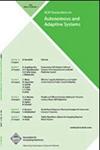Utility-Based Mechanism for Structural Self-Organization in Service-Oriented MAS
IF 2.1
4区 计算机科学
Q3 COMPUTER SCIENCE, ARTIFICIAL INTELLIGENCE
引用次数: 8
Abstract
Structural relations established among agents influence the performance of decentralized service discovery process in multiagent systems. Moreover, distributed systems should be able to adapt their structural relations to changes in environmental conditions. In this article, we present a service-oriented multiagent systems, where agents initially self-organize their structural relations based on the similarity of their services. During the service discovery process, agents integrate a mechanism that facilitates the self-organization of their structural relations to adapt the structure of the system to the service demand. This mechanism facilitates the task of decentralized service discovery and improves its performance. Each agent has local knowledge about its direct neighbors and the queries received during discovery processes. With this information, an agent is able to analyze its structural relations and decide when it is more appropriate to modify its direct neighbors and select the most suitable acquaintances to replace them. The experimental evaluation shows how this self-organization mechanism improves the overall performance of the service discovery process in the system when the service demand changes.面向服务MAS中基于效用的结构自组织机制
在多智能体系统中,智能体之间的结构关系影响着分散服务发现过程的性能。此外,分布式系统应该能够调整其结构关系以适应环境条件的变化。在本文中,我们提出了一个面向服务的多代理系统,其中代理最初根据其服务的相似性自组织其结构关系。在服务发现过程中,智能体集成了一种机制,促进其结构关系的自组织,使系统的结构适应服务需求。这种机制促进了分散的服务发现任务,并提高了其性能。每个代理都有关于其直接邻居和在发现过程中收到的查询的本地知识。有了这些信息,智能体就能够分析其结构关系,决定何时修改其直接邻居更合适,并选择最合适的熟人来取代它们。实验评估表明,当服务需求发生变化时,这种自组织机制提高了系统中服务发现过程的整体性能。
本文章由计算机程序翻译,如有差异,请以英文原文为准。
求助全文
约1分钟内获得全文
求助全文
来源期刊

ACM Transactions on Autonomous and Adaptive Systems
工程技术-计算机:理论方法
CiteScore
4.80
自引率
7.40%
发文量
9
审稿时长
>12 weeks
期刊介绍:
TAAS addresses research on autonomous and adaptive systems being undertaken by an increasingly interdisciplinary research community -- and provides a common platform under which this work can be published and disseminated. TAAS encourages contributions aimed at supporting the understanding, development, and control of such systems and of their behaviors.
TAAS addresses research on autonomous and adaptive systems being undertaken by an increasingly interdisciplinary research community - and provides a common platform under which this work can be published and disseminated. TAAS encourages contributions aimed at supporting the understanding, development, and control of such systems and of their behaviors. Contributions are expected to be based on sound and innovative theoretical models, algorithms, engineering and programming techniques, infrastructures and systems, or technological and application experiences.
 求助内容:
求助内容: 应助结果提醒方式:
应助结果提醒方式:


